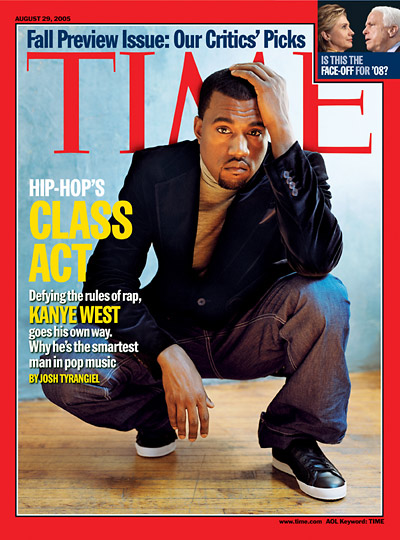
Kanye West fans have been awaiting the Feb. 11 release of his latest album for months–hanging on every name change and track list hint. It’s a far cry from what record executives predicted over a decade ago, before the release of his 2004 studio debut The College Dropout.
As TIME explained in a 2005 cover story about West’s then-burgeoning career—his sophomore album, Late Registration, was about to drop—his middle-class background and decidedly bourgeois style turned off an industry accustomed to selling street-hardened swagger. For Kanye, that made the road ahead a tough one:
The first time Kanye West asked the folks at Roc-A-Fella records to let him rap, there was an uncomfortable silence. As a producer, West had churned out hits for Roc-A-Fella’s intimidating trio of stars—Jay-Z, Cam’ron and Beanie Siegel—and earned praise for his great ear and tireless ethic. But in 2002 the idea that someone like West could be a successful rapper was faintly absurd. “Kanye wore a pink shirt with the collar sticking up and Gucci loafers,” recalls Damon Dash, then Roc-A-Fella CEO. “It was obvious we were not from the same place or cut from the same cloth.” Says Jay-Z: “We all grew up street guys who had to do whatever we had to do to get by. Then there’s Kanye, who to my knowledge has never hustled a day in his life. I didn’t see how it could work.”
Roc-A-Fella wasn’t the only label to pass on Kanye (pronounced Kahn-yay; it means “the Only One” in Swahili) West. Executives at record companies large and small failed to reconcile West’s appearance and demeanor with their expectations of what a rapper should be. They had no idea how to market him. “It was a strike against me that I didn’t wear baggy jeans and jerseys and that I never hustled, never sold drugs,” says West, 28, who grew up in suburban Chicago and often dresses as if he’s anticipating an acceptance letter from Exeter. “But for me to have the opportunity to stand in front of a bunch of executives and present myself, I had to hustle in my own way. I can’t tell you how frustrating it was that they didn’t get that. No joke—I’d leave meetings crying all the time.”
It was Roc-A-Fella, however, that eventually gave him a deal—and scored big when The College Dropout was a major hit. And, as it became a success, so did the aesthetic that the record execs had been so wrong about.
In one sense, however, it was Kanye who was wrong about himself: back in 2005, he told TIME that, as he and his career matured, he would likely tone down his public behavior, as he’d “have a lot more to lose.” More than a decade later, the man who has said that his latest release will be one of the best albums ever made is anything but toned down.
Read the whole 2005 cover story, here in the TIME Vault: Hip-Hop’s Class Act
More Must-Reads From TIME
- The 100 Most Influential People of 2024
- Coco Gauff Is Playing for Herself Now
- Scenes From Pro-Palestinian Encampments Across U.S. Universities
- 6 Compliments That Land Every Time
- If You're Dating Right Now , You're Brave: Column
- The AI That Could Heal a Divided Internet
- Fallout Is a Brilliant Model for the Future of Video Game Adaptations
- Want Weekly Recs on What to Watch, Read, and More? Sign Up for Worth Your Time
Write to Lily Rothman at lily.rothman@time.com